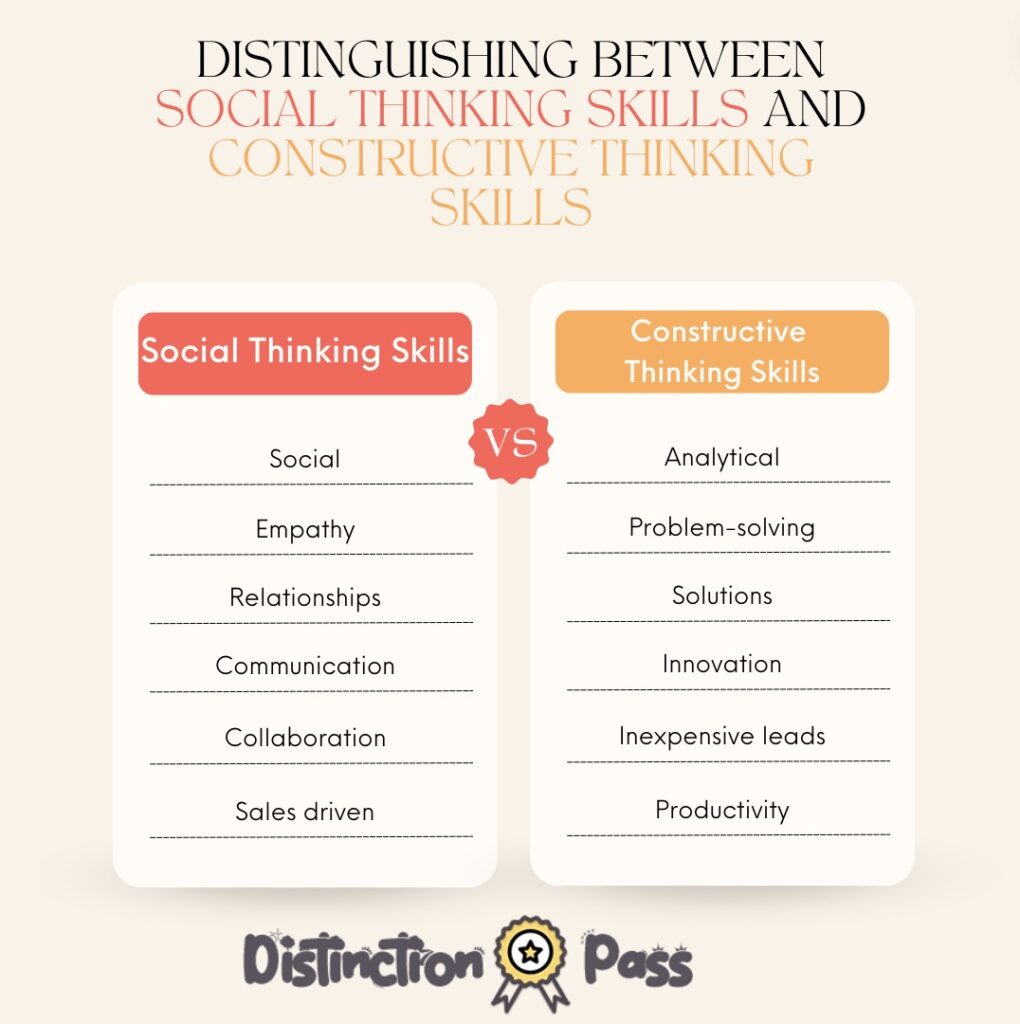Distinguishing Between Social Thinking Skills and Constructive Thinking Skills

Question: What is the difference between social thinking skills and constructive thinking skills?
Answer: Social thinking skills are the abilities related to understanding and managing social interactions and relationships, while constructive thinking skills involve problem-solving and critical thinking abilities to constructively handle situations and challenges.

Social Thinking Skills
Social thinking skills are essential for navigating social environments. These skills help individuals interpret and respond appropriately to social cues, such as body language, tone of voice, and facial expressions. Social thinking skills are crucial for building relationships, collaborating with others, and understanding different perspectives. For example, empathy—the ability to understand and share the feelings of another person—is a key social thinking skill that helps in fostering connections and building trust.
In the workplace, social thinking skills can enhance teamwork and communication. Imagine a scenario where a team member misinterprets a colleague’s feedback as criticism. With strong social thinking skills, the individual can perceive the feedback as constructive, leading to a productive discussion rather than a conflict.
Constructive Thinking Skills
Constructive thinking skills, on the other hand, are focused on approaching problems and challenges with a positive and solution-oriented mindset. These skills include critical thinking, creativity, and the ability to adapt to new situations. Constructive thinking is about finding practical solutions and making informed decisions, often requiring a step-by-step approach to identify, analyze, and solve problems.
For instance, in 2020, the sudden shift to remote work due to the COVID-19 pandemic required many companies to adapt quickly. Those with strong constructive thinking skills were able to devise innovative solutions, such as implementing new technologies and workflows, to maintain productivity and communication. This adaptability is a hallmark of constructive thinking skills, as it involves thinking outside the box and being resilient in the face of challenges.
Importance of These Skills
Both social and constructive thinking skills are crucial in personal and professional settings. In the workplace, they contribute to effective communication, problem-solving, and overall productivity. Social thinking skills help in understanding team dynamics and managing interpersonal relationships, while constructive thinking skills enable employees to tackle complex issues and improve processes.
A study conducted by the Harvard Business Review in 2019 found that organizations that encourage the development of both social and constructive thinking skills in their employees reported a 20% increase in overall performance and a 15% increase in employee satisfaction. This indicates that a balanced approach to developing these skills can lead to significant improvements in workplace efficiency and morale.
The Future and Solutions
As we move towards an increasingly digital and globalized world, the importance of these skills will only grow. With the rise of remote work and virtual teams, social thinking skills will be essential for effective communication and collaboration across different cultures and time zones. Meanwhile, constructive thinking skills will be crucial for navigating the complexities of an ever-changing business landscape, where innovation and adaptability are key.
To foster these skills, educational institutions and organizations can implement training programs focused on social-emotional learning and critical thinking. Legal frameworks, like the Every Student Succeeds Act (ESSA) in the United States, emphasize the development of these skills in students, recognizing their importance in preparing for the workforce and civic life.
In conclusion, while social thinking skills and constructive thinking skills serve different purposes, they are both essential for personal and professional growth. By developing these skills, individuals can better navigate social situations, solve problems effectively, and adapt to new challenges, ultimately leading to a more fulfilling and successful life.
Stay tuned for more insights on how to cultivate these skills in your daily life!
